- Home
- Anne McCaffrey
Crisis On Doona
Crisis On Doona Read online
eventhorizonpg.com
“MAYDAY, MAYDAY,” a voice repeated over and over again in Middle Hrruban through thick static on the audio pickup, “Anyone who is within the sound of my voice, Mayday! We require assistance. Our ship is down and damaged. Mayday!”
Todd Reeve and his friend Hrriss, at the controls of the Alien Relations Department scout ship Albatross, stared at one another in surprise. It was impossible to tell if the speaker was male or female, a Human like Todd, or a catlike Hrruban like Hrriss. The message repeated, sounding more panic-stricken.
“Where’s that coming from?” Todd demanded, scanning the readouts on his control panel. They had just emerged from the second warp jump on their journey back to their homeworld of Doona from a diplomatic mission on the nascent colony world of Hrretha, and had not yet taken bearings on their position to initiate the third.
Hrriss’s retractable claws extended as he reached for the controls. There was a low humming as the ship’s benchmark program triangulated the distress signal and readings began to register. The readouts indicated they were positioned beyond the envelope of a star system whose blue-white primary glittered coldly on their screen. “Not too very frrr away. It comes from the vicinity of this sssystem’s fourth planet,” he said in a low, cautious voice that resembled a cat’s purr.
“We’ve got to respond,” Todd insisted at once.
Hrriss shook his head, his pupils widening over green irises. “Todd, we cannot. We bear the markings of a Trran ship, your Alrrreldep, and this system is interdicted by the Hrruban exploration arm. It would be a violation of the Zreaty of Doona to enter this sssystem.”
“But it’s a Mayday! You have to answer Maydays,” Todd insisted, staring at his friend in disbelief. “The oldest naval laws on Earth required it. Space laws can’t be so rigid as to deny assistance in an emergency. Someone’s in trouble! They need our help. Why is this one interdicted?” Todd demanded. “What’s so dangerous about it?”
“Explorers from my people have claimed this system, called Hrrilnorr, for mineral exploitation, but also perhaps for colonization,” the Hrruban explained.
In the Archives established on the Treaty Island back on Doona/Rrala, extensive records were kept of the status of various systems in each species’ chosen sector of exploration. Though Doona was cohabited by Humans and Hrrubans, each race had committed to a Treaty specifying separate territorial rights to all other claimed systems.
“There are trace radioactive elements on the inner, solid worlds,” Hrriss went on. “The Byzanian Glow Stones of the fourth planet have a curious, milky glow, most beautiful to look upon. They had a strange, mesmerizing effect upon my people, but even more odd upon the analysis equipment they carried. The glow affects short-term memory of both people and things. Until the effects have been proved hrrrrmless, no one may enter here.”
Hrriss regarded Todd, his closest friend of either species anywhere in the galaxy. They both knew how Treaty Law read. Violation of a system claimed by the other species was an overt act of hostility, which could end in war. The penalties for infractions started with grounding of the ship, and could end with them in prison on a hardship mining colony, or worse yet, remanded to Earth and Hrruba, separated forever.
Todd set his jaw. “If we start ignoring fellow beings’ cries for help, we’re no better than Rralan snakes. Someone’s in trouble. We heard it. The voice said ‘our’ ship. ‘We’ require assistance. So there’s more than one of them! We have to help.”
Hrriss shook his head slowly, clearly uneasy. Todd took charge.
“Look, it’s my responsibility. The ethics of my culture require me to act.” He prodded his chest. “I’d never forgive myself for ignoring that call and letting people die. Besides, we’re in this sector of space and we could be in bigger trouble for ignoring a Mayday—if someone else comes by.”
Hrriss regarded his friend somberly. “This is not a very well travelled area and the system is interdicted.” Hrriss then saw how Todd’s jaw was set and the implacable expression on his face and knew that his friend would not yield. So the Hrruban gave a slow nod of acceptance. “We have both heard the Mayday. I will say that I insisted on answering though you argued that the system was interdicted!” The Hrruban dropped his jaw in his distinctive grin. “It is better thus. The initial blame is mine, for this is a Hrruban system. I convinced you we must respond.”
Todd’s expression cleared immediately and he gripped his friend’s shoulder in relief and approval. “I’d rather acknowledge my own errors, Hrriss, but your idea makes too much sense in this instance. So, just this once, I’ll let you carry the can for one of my bright ideas. Anyway, the ship’s recorders are ... Wait a minim ...” He tapped the small illuminated dial on the panel between them. “Log’s not recording, Hrriss. No movement whatever on the VU meter. Those flaming Hrrethans ... I told them the Albatross had been serviced before we went out on this jaunt ...” As he grumbled, he lifted himself out of his chair. “I’ll go see.”
“That recording is important, Zodd.” Hrriss called after him.
“Don’t I just know it?” Todd hurried down the narrow companionway to the engineering compartment, growling Hrruban curses under his breath.
Duplicate meters to those on the pilot’s consoles were attached to the front of each panel in the rear section. Todd dashed past the standing cases that operated space drives, life support, landing gear, food service to a blue and pipeclay cabinet. The feed switcher in the center of the panel was on the correct output. The dials were jumping, following the audio of the Mayday call still blaring over the speakers. Obviously the power was running. Only one set of dials wasn’t working, the one attached to the holographic log recorder at the foot of the panel.
“Wouldn’t you just know? Those Hrrethans aren’t worth the leather they belt with!” Todd groaned. Every system had been in perfect working condition before the Hrrethans insisted on the mechanical-overhaul courtesy.
Frustrated, Todd kicked the front panel of the device and turned to look for the toolbox. With a wowing sound like a bear waking up from hibernation, the recorder started to move again, its disk turning and needles moving. Surprised, Todd glared at it and stalked disgustedly back to the pilot’s chair.
“The good ol’ reliable correcting kick. Try it again, Hrriss.”
“A-OK now.”
“Them and their ‘courtesy,’ ” Todd muttered, watching the VU activity as the Mayday was now obviously being recorded. That “courtesy” had been yet another delay when he was fretting to get back aboard the Albatross and out of the tight uniform he had to wear on such occasions. Sometimes the courtesy appearances that he and Hrriss had to undertake as representatives of their respective cultures were unredeemed boredom as well as too much spit, polish, and restricting clothing: this latest jaunt to open a new transportation facility at Hrretha being an excellent example. “Wonder how long that Mayday’s been bleating?” From his training in space flight, he knew the fate of spacers whose life support ran out. Recorders on passenger liners kept on until power was exhausted. Others ended when no more activity was recorded by the life support systems. “I’d hate to think we’d jeopardized everything for a cargo of corpses.”
“We will assume rescue is required,” Hrriss said. He transmitted a reply. “Stranded ship, this is the Albatross. We rrreceive your message and are coming to help. I will make the course correction,” Hrriss added, working without looking up.
As they passed through the heliopause, a wild wailing made the cabin speakers vibrate unpleasantly. Hrriss’s ears flattened against his head, and his eyes narrowed.
“Perimeter buoy,�
�� he said, wincing. “I knew we ought to be close to one. Can never dodge them. Good engineering. Records even the most fleeting pass,” he said, reading the control panel, “and our entry. It will also broadcast a rrrecord of the intrusion to the Zreaty Island beacon,” he reminded Todd, his tone gloomy.
“So? It’s not as if we didn’t expect one,” Todd said, his eyes on the screen. “We’re committed now.” His remark was more statement than a request for agreement.
The blue-white sun was a dwarf, much the size of Sol in the Earth home system. The Albatross had come out of its jump directly above it, so that the computer-plotted ellipses of its seven planets spread out below the ship like ripples in a pond. The Mayday originated from the fourth planet from the sun, a small, solid sphere with a ring of eight small and irregular satellites. The triangulation crosshatches appeared on the viewscreen and closed down on a point near the planetary equator, and just passing into the night meridian. Anxiously they watched the blip disappear around the planet’s curve. Todd adjusted the Albatross’s course to meet its orbit at the earliest possible moment.
Though it took a long time for the scout to cross the distance to the fourth planet, neither Todd nor Hrriss moved. Todd leaned forward, elbows on knees, watching the planet and its moons grow on the viewscreen. Unconsciously he rubbed at his neck where the tight formal tunic had rubbed the skin. Even though he was now in the comfortable one-piece shipsuit, he still felt the constriction. Another reason he loathed these formal occasions. Why they never made the collars or sleeves with sufficient material to encompass one’s neck or biceps Todd could not figure out.
Hrriss sat, apparently at his ease in his impact couch, but his tail tip switched back and forth, revealing tension.
“That buoy was alive and kicking, so no smart marauder has tried to blank it and get in for a quick decco. Of course, if any of those stones turn up on the market, the vendor’s in real deep kimchee,” Todd said, shooting Hrriss a mischievous grin. “Or maybe they’ll try to tell us that their equipment’s malfunctioning and they didn’t ‘hear’ the buoy.” His grimace was mocking as he shoved a finger in his ear, pretending to clear it of a deafening obstacle.
“I am still uneasy myself about entering here,” Hrriss admitted. “Zomezing makes my hackles rise.” He shook his maned head and then extended both long arms in a gesture of futility. “But we have no choice if lives are at stake.”
“This shouldn’t take that long,” Todd said reassuringly, making sure the Albatross was on course. “Not more than a few hours. In any case, a rescue is surely a defensible reason for breaking prohibition.” He sighed, once again easing the soft collar off the back of his rubbed neck. “I’ll be glad when we can slough this sort of duty off on someone else. I hated leaving home while all the Treaty Renewal debates are going on. I was needed there,” and he jabbed a finger in the spatial direction of Rrala, “not there!” A second jab, contemptuous this time, was for the system they had just left. Todd’s eyes locked on the viewscreen showing the fourth planet, and he began to tap his fingers impatiently on the console.
“Will only your two hands hold back the flood tides of disaster?” Hrriss asked him teasingly, to relieve the tension.
Todd turned red and laughed sheepishly. “Hope there’s no flooding at all. But you gotta admit, Hrriss, I speak the best formal High Hrruban of anyone on the Treaty Island.”
“That I do admit,” and Hrriss’s eyes glowed warmly. “Did I not help teach you myself?”
What Hrriss did not add was that, in many eyes, Todd was the first real Doonan. The experts said you couldn’t true-teach another language to an adult, but a very young child could assimilate one as if it was his mother tongue. Todd, with his booming voice, far-ranging ways, and quick mind, was the first Terran totally at home on Rrala, the Hrruban and official name for Doona. Life on Earth was too confining, too rigid for the six-year-old he was when he arrived on Doona. He was thirty-one now. His swift adoption of Hrruban ways and language, and his innate courtesy, made him, when he came of age, a natural choice for Alreldep’s diplomatic service. Over the years, Todd had been careful to be most punctilious about courtesies and laws, schooling himself to ignore slights and insults that often roused his hot temper and begged for retaliation.
“I feel as you do about the Zreaty negotiations,” Hrriss said firmly. “The arrangement must continue. I cannot conceive of going back to Hrruba. My life is on Rrala. My career, my family, my hrrss ... and my best friend.” His grin exposed awesome teeth.
Todd grinned back. “Mine, too. Well, you’d think that twenty-five years of peaceful coexistence between Human and Hrruban on Rrala would convince them,” Todd offered. “The trouble is, we’re the ones living with it. I’m worried about the politicians, too far removed from the situation, who have power over it. They’re liable to dissolve the Treaty without considering the effect on the people already involved.”
“Zat is undoubtedly trrue,” Hrriss acknowledged. “We have been on enough diplomatic missions to see where the distant governments have made purely political decisions that are irrrrelevant to the true needs of the colony. Theirr continued meddling without sufficient investigation borrrderrrs the rrridiculous.”
“In the words of an unknown but often quoted Terran philosophist, ‘ain’t that the truth!’ ”
As the first successful attempt at colonization of a nonmining, pastoral world, Doona was the natural focus of much curiosity and speculation on Earth. The Space Department and the Colonial Department of the Amalgamated Worlds were beside themselves with pride and worry lest the experiment prove to be a failure, after all, leaving them without sufficient funding or approval to send more missions and colonists into space.
Spacedep, as represented by then-Commander Al Landreau, had suffered humiliation in the Amalgamated Worlds government when the first Terran colonists found a Hrruban village on Doona across the river from their own landing site. No habitation had shown up in any of Landreau’s scans, but the village was discovered to be very much an inhabited site. Because it was Ken Reeve—and his six-year-old son, Todd—who had managed to prove that aliens were, in fact, resident on Doona. Landreau resented the Reeve family more than any of the other eleven original colonists. Not only did the mysterious appearance of an alien species on Doona seriously compromise the Phase I operation under Spacedep, and Commander Al Landreau; but also the repercussions reverberated through the Colonial Department (Codep) for permitting Phase II to be initiated and colonists placed on the planet. The most stringent rule of the Terran Colonization Plan was to avoid planets which harbored another sentient species.
Landreau was not actually at fault. The Hrrubans had not been “in residence” at the time of his extensive survey. By matter transmitter, the Hrrubans had moved their entire village back to their home planet of Hrruba, since the winter months on Doona/Rrala were long and harsh. But Landreau neither forgot nor forgave the humiliation of being wrong.
However, the visionary leaders of both species had decided to make the best of this coincidental colonization: to prove that two alien species could interact without exploitation or contamination. Doona/Rrala became the vital test for Human and Hrruban.
The original colonists of both species were allowed to stay, and more of each species joined the project, under the loosest of control by their respective governments. Both races were determined to make this project work and prosper. And they were scrupulous in keeping to the rules laid down by the momentous Decision at Doona, where a six-year-old boy translated the relevant clauses.
The original twenty-five years of that Decision were nearly over and renegotiation soon to be discussed. Both Todd and Hrriss knew of the recent incidents which they were certain had been arranged with the express aim of creating dissension between Hrruban and Human, rupturing the Treaty, and, more important, preventing a renewal of the unique settlement on Doona/Rrala.
Over 100,000 settlers,
Doonan and Rralan, now lived on the beautiful planet, year in and out, benefiting from their complementary skills and strengths, and surviving the intense and bitter winters by mutual support. If the Treaty was not renewed, the settlers would be forced to return to homeworlds with which they were no longer in charity. More heart-rending, staunch friends would be forever separated: like Todd and Hrriss.
All the while that Hrrubans and Hayumans lived in harmony on their planet, space exploration had exploded in all directions—always aware that each species was forbidden to explore sectors clearly marked with space buoys of the other.
Although Landreau never forgave either species, he had gone on to discover so many other systems and planets useful to his own kind that he quickly achieved the rank of Admiral. In a way he owed that to the Decision at Doona, which had brought him to the notice of his superiors. His own efforts had kept him in a highly visible situation. Judicious manipulations on his part, the tacit assistance of powerful companies interested in acquiring rich planets, moons, and asteroids, and diplomatic overtures to high-ranking government officials had resulted in his promotion to the head of Spacedep, twenty-two years after the Doona affair.
Landreau had looked for, and found, others who shared his dislike of the Doona Decision. Some purists had always argued that a treaty promulgated through the linguistic precocity of a kid had to be defective. Certainly that most honest and unambiguous of treaties proved troublesome to some ambitious and aggressive Humans.
Landreau carefully cultivated such officials, always seeking a way to burst the Doonan idyll—and avenge himself on the Reeves. Subtly, of course, for he would not risk his current high status: especially one which allowed him the facilities of Spacedep’s far-flung resources and highly skilled and trained personnel. If some of the immense budget available to Spacedep’s Commander in Chief was siphoned off to explore a way to achieve personal vengeance, it was admirably hidden in the morass of official reports, payments, and analyses.

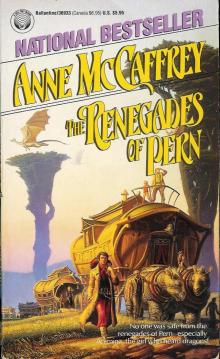 The Renegades of Pern (dragon riders of pern)
The Renegades of Pern (dragon riders of pern)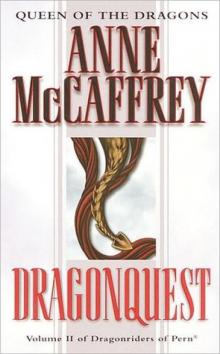 Dragonquest
Dragonquest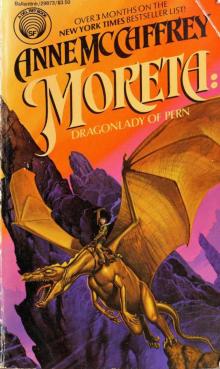 Moreta (Dragonlady of Pern)
Moreta (Dragonlady of Pern)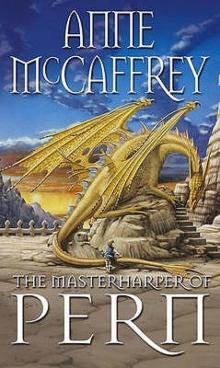 The Masterharper of Pern
The Masterharper of Pern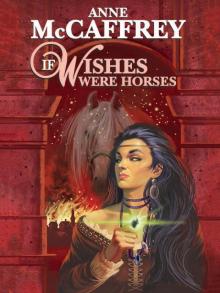 If Wishes Were Horses
If Wishes Were Horses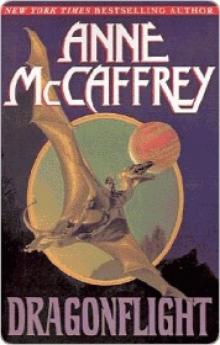 Dragonflight
Dragonflight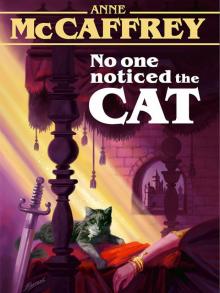 No One Noticed the Cat
No One Noticed the Cat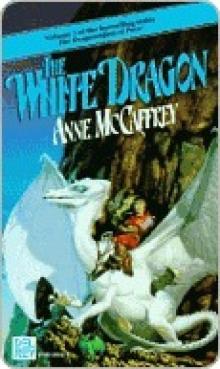 The White Dragon
The White Dragon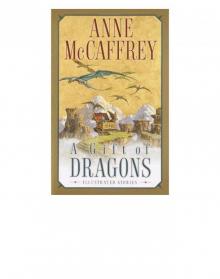 A Gift of Dragons
A Gift of Dragons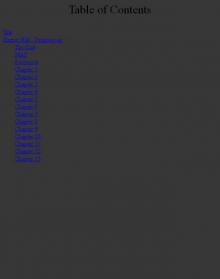 Harper Hall - Dragonsong
Harper Hall - Dragonsong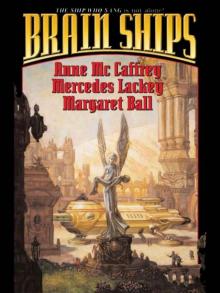 Brain Ships
Brain Ships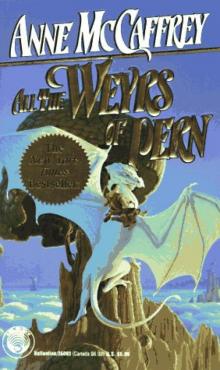 All The Weyrs of Pern
All The Weyrs of Pern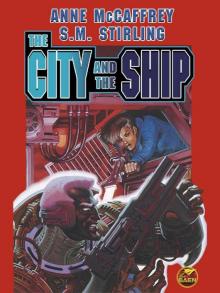 The City and the Ship
The City and the Ship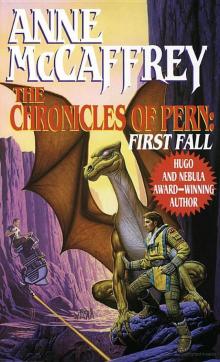 The Chronicles of Pern: First Fall
The Chronicles of Pern: First Fall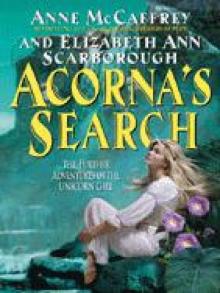 Acorna’s Search
Acorna’s Search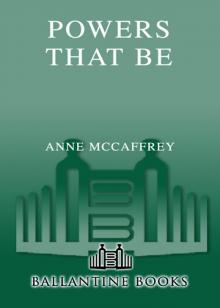 Powers That Be
Powers That Be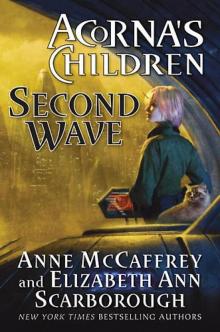 Second Wave
Second Wave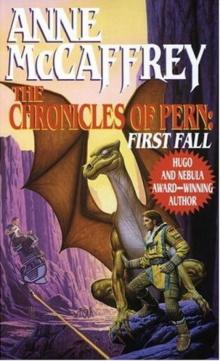 Chronicles of Pern (First Fall)
Chronicles of Pern (First Fall)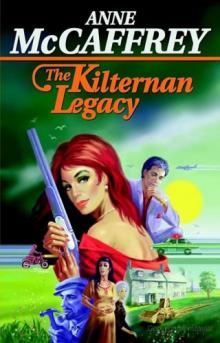 The Kilternan Legacy
The Kilternan Legacy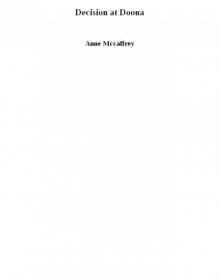 Decision at Doona
Decision at Doona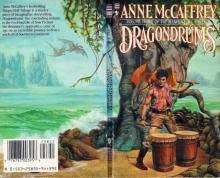 Dragondrums (dragon riders of pern)
Dragondrums (dragon riders of pern)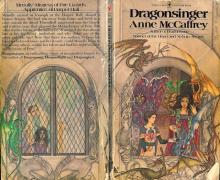 Dragonsinger (dragon riders of pern)
Dragonsinger (dragon riders of pern)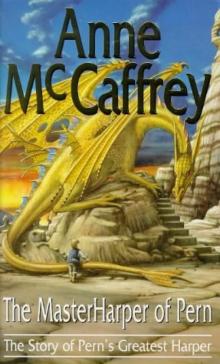 The Master Harper of Pern
The Master Harper of Pern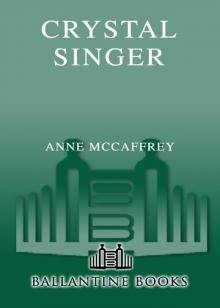 Crystal Singer
Crystal Singer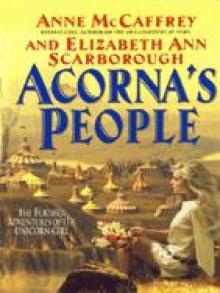 Acorna’s People
Acorna’s People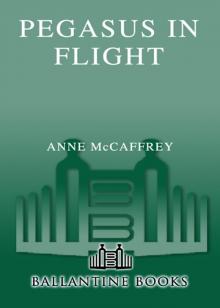 Pegasus in Flight
Pegasus in Flight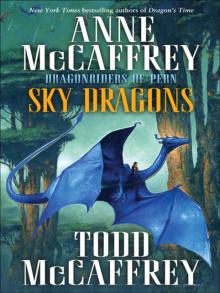 Sky Dragons Dragonriders of Pern
Sky Dragons Dragonriders of Pern Dragonriders of Pern 4 - Dragonsinger
Dragonriders of Pern 4 - Dragonsinger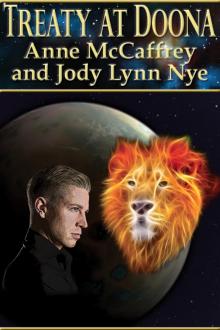 Treaty at Doona
Treaty at Doona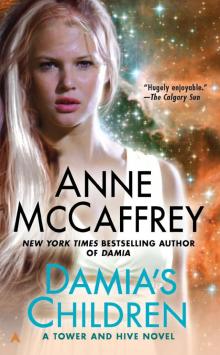 Damia's Children
Damia's Children Stitch In Snow
Stitch In Snow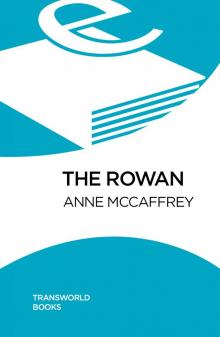 The Rowan
The Rowan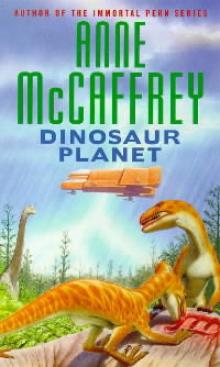 Dinosaur Planet
Dinosaur Planet The Year of the Lucy
The Year of the Lucy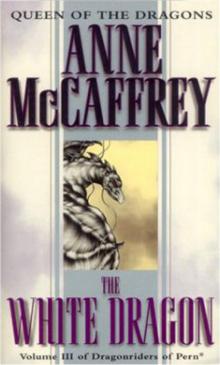 The White Dragon p-4
The White Dragon p-4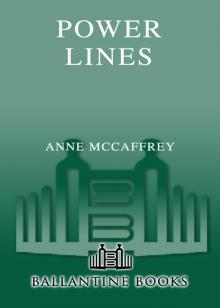 Power Lines
Power Lines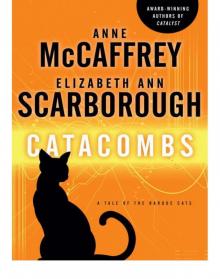 Catacombs
Catacombs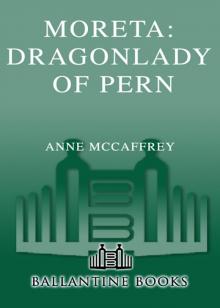 Moreta
Moreta Dragonsinger
Dragonsinger Crystal Line
Crystal Line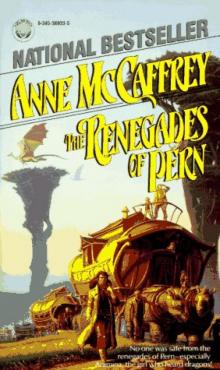 The Renegades of Pern
The Renegades of Pern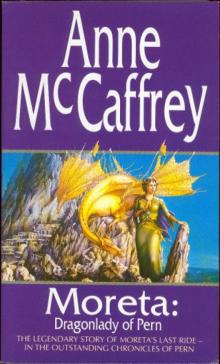 Moreta - Dragonlady of Pern p-8
Moreta - Dragonlady of Pern p-8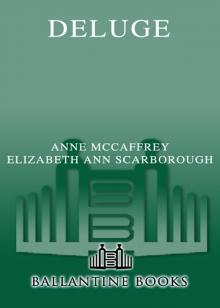 Deluge
Deluge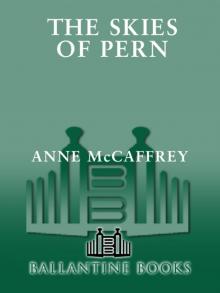 The Skies of Pern
The Skies of Pern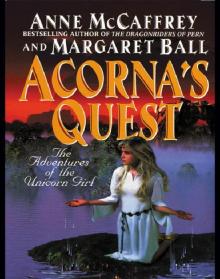 Acorna's Quest
Acorna's Quest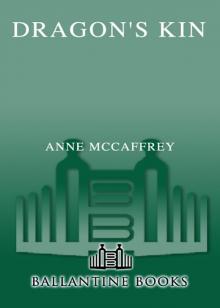 Dragon's Kin
Dragon's Kin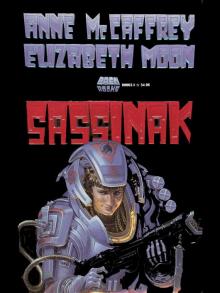 Sassinak
Sassinak![Crystal Universe - [Crystal Singer 03] - Crystal Line Read online](http://i1.bookreadfree.com/i1/03/31/crystal_universe_-_crystal_singer_03_-_crystal_line_preview.jpg) Crystal Universe - [Crystal Singer 03] - Crystal Line
Crystal Universe - [Crystal Singer 03] - Crystal Line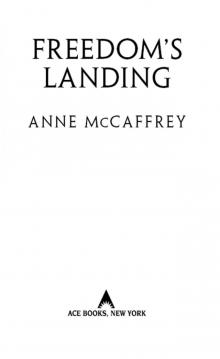 Freedom's Landing
Freedom's Landing Acorna’s Quest
Acorna’s Quest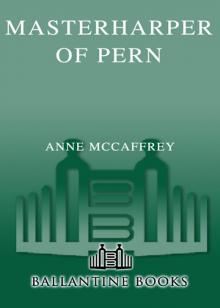 Masterharper of Pern
Masterharper of Pern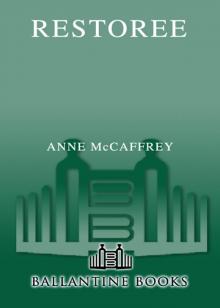 Restoree
Restoree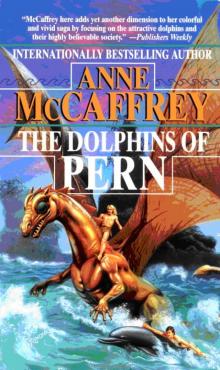 Dolphins of Pern
Dolphins of Pern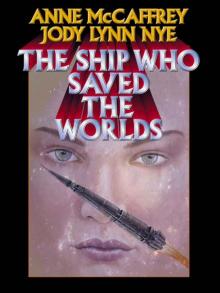 The Ship Who Saved the Worlds
The Ship Who Saved the Worlds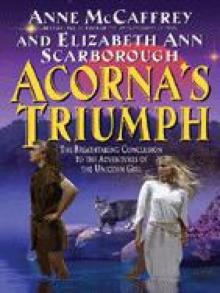 Acorna's Triumph
Acorna's Triumph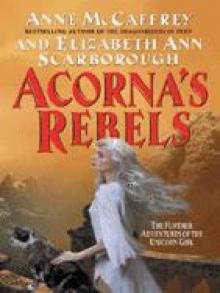 Acorna's Rebels
Acorna's Rebels![[Acorna 08] - First Warning: Acorna's Children (with Elizabeth Ann Scarborough) Read online](http://i1.bookreadfree.com/i1/04/06/acorna_08_-_first_warning_acornas_children_with_elizabeth_ann_scarborough_preview.jpg) [Acorna 08] - First Warning: Acorna's Children (with Elizabeth Ann Scarborough)
[Acorna 08] - First Warning: Acorna's Children (with Elizabeth Ann Scarborough)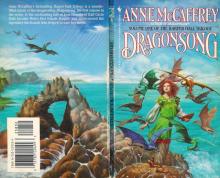 Dragonsong (dragon riders of pern)
Dragonsong (dragon riders of pern)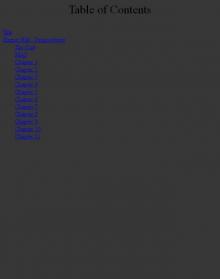 Dragonriders of Pern 6 - Dragondrums
Dragonriders of Pern 6 - Dragondrums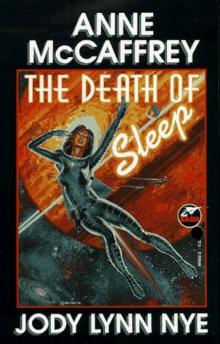 The Death of Sleep
The Death of Sleep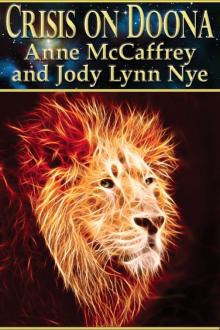 Crisis On Doona
Crisis On Doona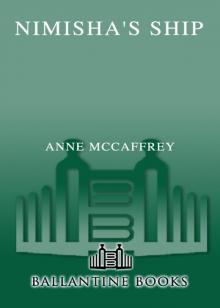 Nimisha's Ship
Nimisha's Ship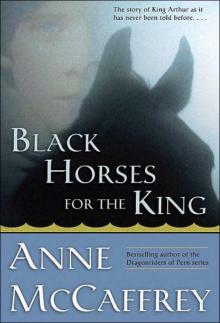 Black Horses for the King
Black Horses for the King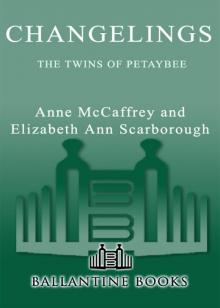 Changelings
Changelings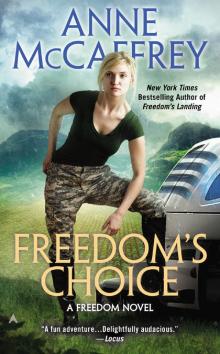 Freedom's Choice
Freedom's Choice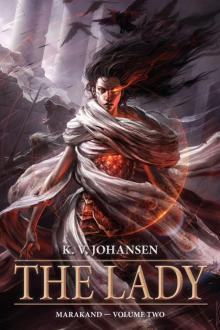 The Lady
The Lady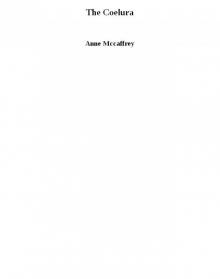 The Coelura
The Coelura Catalyst
Catalyst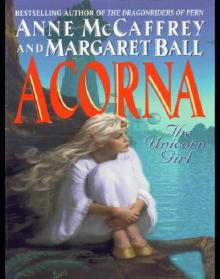 The Unicorn Girl
The Unicorn Girl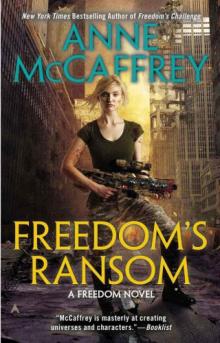 Freedom's Ransom
Freedom's Ransom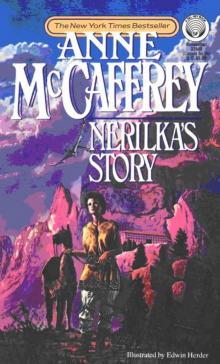 Nerilka's Story
Nerilka's Story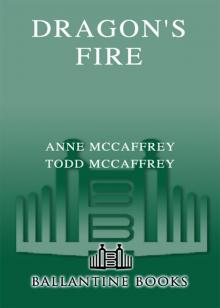 Dragon's Fire
Dragon's Fire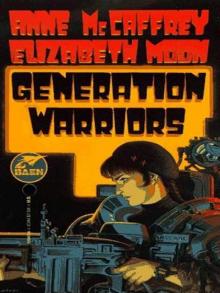 Generation Warriors
Generation Warriors Lyon's Pride
Lyon's Pride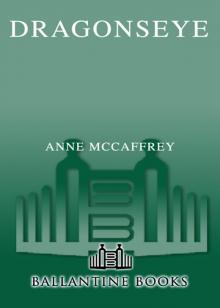 Dragonseye
Dragonseye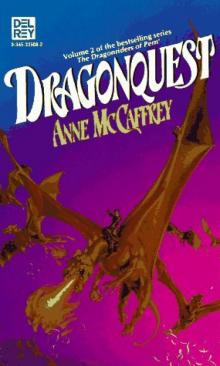 Dragon Quest
Dragon Quest Dragondrums
Dragondrums Dragonsong
Dragonsong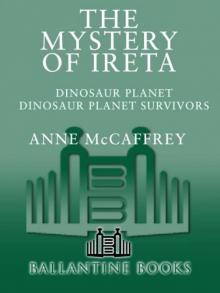 The Mystery of Ireta
The Mystery of Ireta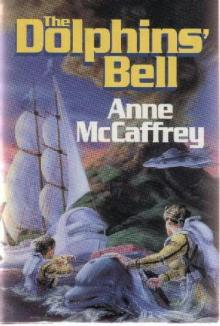 Dolphins' Bell
Dolphins' Bell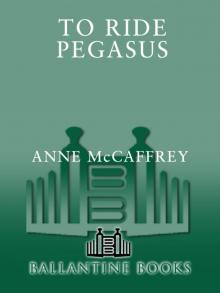 To Ride Pegasus
To Ride Pegasus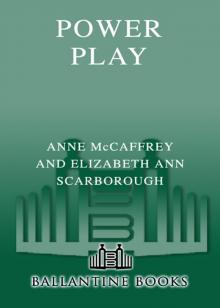 Power Play
Power Play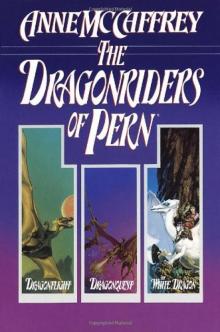 The Dragonriders of Pern
The Dragonriders of Pern An Exchange of Gifts
An Exchange of Gifts The Ship Who Sang
The Ship Who Sang Sky Dragons: Dragonriders of Pern
Sky Dragons: Dragonriders of Pern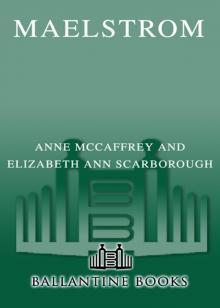 Maelstrom
Maelstrom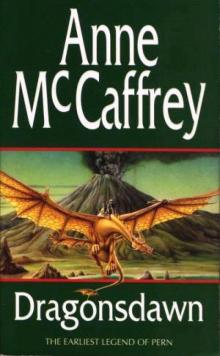 Dragons Dawn
Dragons Dawn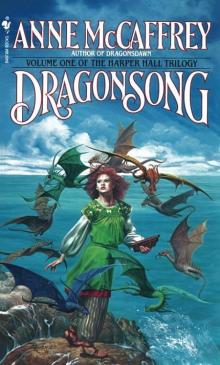 Dragon Song
Dragon Song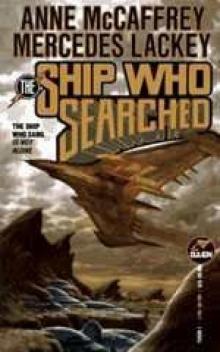 The Ship Who Searched b-3
The Ship Who Searched b-3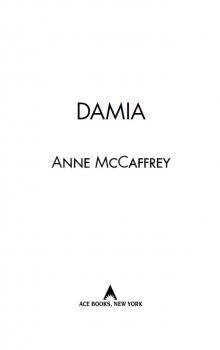 Damia
Damia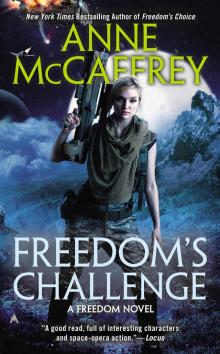 Freedom's Challenge
Freedom's Challenge